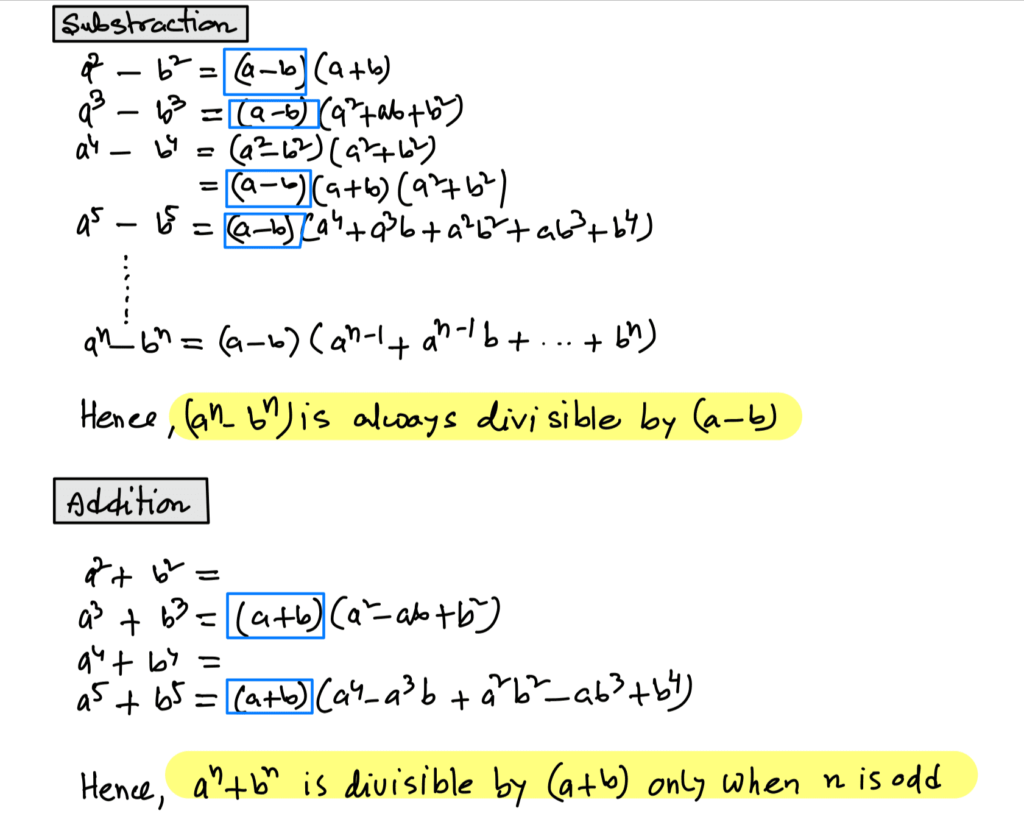( an – bn ) is always divisible by (a – b) whereas ( an + bn ) is divisible by (a + b) only when n is odd. See the following image for various expansion of the terms.

Question: ( xn – an ) is completely divisible by (x – a) when
(a) n is any natural number
(b) n is even natural number
(c) n is odd natural number
(d) n is prime
Ans: (a) n is any natural number
Explanation:
( xn – an ) is always divisible by (x – a).
Question: ( 26n – 42n ) is always divisible by (n is a natural number)
(a) 15
(b) 18
(c) 36
(d) 48
Ans: (d) 48
Explanation:
26n – 42n = (26)n – (42)n is always divisible by
26 – 42 = 64 – 16 = 48
Question: \displaystyle{\frac{2222^{9999}+5555^{9999}}{7}} , Remainder?
(a) 0
(b) 1
(c) 3
(d) 5
Ans: (a) 0
Explanation:
( an + bn ) is divisible by (a + b) when n is odd
Hence, 22229999 + 55559999 is divisible by
2222 + 5555 = 7777, this is multiple of 7
Hence, remainder = 0
Question: \displaystyle{\frac{2^{70}+3^{70}}{13}} , Remainder?
(a) 0
(b) 1
(c) 3
(d) 5
Ans: (a) 0
Explanation:
270 + 370 = (22)35 + (32)35 = 435 + 935
We know, for n = odd
( an + bn ) is always divisible by (a + b)
Now, 4 + 9 = 13
So, remainder = 0
Aliter:
Question: \displaystyle{\frac{16^3+17^3+18^3+19^3}{70}} , Remainder?
(a) 0
(b) 1
(c) 3
(d) 5
Ans: (a) 0
Explanation:
( an + bn + cn + dn ) is divisible by (a + b + c + d) when n is odd
Here, n = 3 (odd)
16 + 17 + 18 + 19 = 70
Hence, remainder = 0

असली मनोवैज्ञानिक यहाँ हैं
mediums who see the future are on this website
I wasn’t a big believer in psychics until I came across this site, they do excellent work, I recommend it to everyone.
What i don’t understood is in truth how you are not really much more neatly-liked than you might be right now. You are very intelligent. You already know thus significantly in terms of this subject, made me individually believe it from so many numerous angles. Its like men and women don’t seem to be interested until it is something to accomplish with Girl gaga! Your personal stuffs nice. Always maintain it up!
We’re a bunch of volunteers and starting a new scheme in our community. Your site offered us with helpful information to paintings on. You have done an impressive process and our entire community will likely be grateful to you.